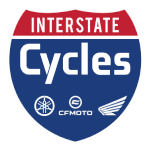Motorcycle Brakes Maintenance
 Your motorcycle brakes are a critical part of the whole machine. To ensure smooth functioning when you’re out on your bike, there are plenty of maintenance tasks you can do without a bunch of specialized tools. Before you begin, always consult your owner’s manual to ensure you know any specific recommendations or suggestions for your model.
Your motorcycle brakes are a critical part of the whole machine. To ensure smooth functioning when you’re out on your bike, there are plenty of maintenance tasks you can do without a bunch of specialized tools. Before you begin, always consult your owner’s manual to ensure you know any specific recommendations or suggestions for your model.
At Interstate Cycles in Lake City, Florida, we want our clients to keep their bikes in the best shape possible. With that in mind, we’ve put together this helpful guide on DIY bike maintenance. If you need expert motorcycle repairs, contact our service department and we’ll whip your machine into shape in no time!
Note: Always work in a well-ventilated space to avoid breathing in dust and fumes. Make sure to cover your eyes for the same reason. Use a rag and spray brake cleaner instead of an air blow gun. Be careful when working with brake fluid as it can harm the paint on your bike if it makes contact. Wash off with water quickly if that happens.
Pulsing Brakes
If you feel your motorcycle brakes pulsing when used, it’s time for some DIY bike brake maintenance! This happens when you drag the brakes or use them heavily, which causes the discs to become overheated and then warp. While it’s possible to fix this, it’s often best to replace the warped rotors. This can be a bit spendy but if you look around, you can find cheaper options. Also, before you change the rotors make sure it’s not sticking caliper sliders and pistons that are causing the problem.
Squealing Brakes
Does your motorcycle make a squeaky grinding sound that gets louder when you brake hard? This is probably the result of worn out brake linings. As they wear down, their caliper pistons extend, which results in lower brake fluid levels. Check your brake pads with a flashlight. You can even take them out to examine the thickness. This is why there are patterns on them, so you can see how much they’ve worn down.
Sometimes the brakes squeal when the brake pads start vibrating in their calipers. To stop this, remove and sand both pads and rotor(s) with 120-grit emery cloth and apply an anti-squeal product to the back of the brake pads. Then replace them properly. This should reduce the squealing sounds and improve performance while braking.
Wearing Out Quickly
If the brake pads on your motorcycle wear out too fast, a caliper piston or a slider may be sticking. Start by cleaning and lubricating any slides or pivot points, then apply a high-temperature silicone brake grease. If your bike has floating callipers, you’ll have to unbolt them to check and replace brake pads. Remove the caliper bolts and slip the caliper off to get to work.
If you’re going to be removing old pads, gently pry them to push the pistons back. If the pistons don’t move, you may need to get the caliper rebuilt or replaced. Pushing pistons can result in overflow of the master cylinder reservoir. To avoid this, connect a small hose to the bleeder and let it drain in a can. Open the bleeder just as you start to pry and close it as soon as the piston is retracted.
Bleeding Brakes
Your brake fluid will absorb moisture over time (which lowers performance) and should be replaced every year or two depending on usage. You can get a small brake bleeding kit and keep a can/bucket ready to catch the fluid. You should never let your brake fluid get too dark. Before you begin, keep in mind that brake fluid can damage plastic and paint so cover those areas of your motorcycle and have a rag ready to wipe it off anything it gets on.
Attach your bleeding kit to the brake fluid nipple on the brake calliper. Then loosen the nipple so the fluid can begin to drain into your can. Remove the master cylinder cap to refill brake fluid into the master cylinder as you bleed the brakes. Keep this level up and pump the lever until you see the drained fluid become clear. Ensure there are no air bubbles and then maintain pressure on the brake level and re-tighten the brake fluid nipple. Replace the cylinder cap and remove your bleeding kit.
We hope this guide helps you perform some basic motorcycle brake maintenance tasks at home! If you’re not sure about your skills in this area or just want professional service for your motorcycle, contact Interstate Cycles in Lake City, FL and one of our expert technicians will gladly assist you! If you’re looking for motorcycle service and repair near Jacksonville or Gainesville, get in touch with our service department today.
